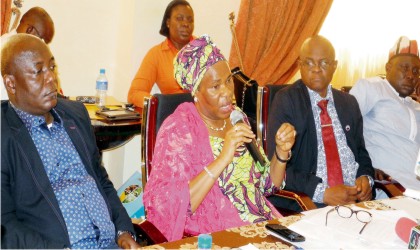Niger Delta
Floods: INC Mulls Legal Action Against FG …Condemns Farouq’s Comments On Bayelsa

Following the hardships and other resultant impacts of the 2022 ravaging floods across the Niger Delta, especially in Ijaw land,
The Ijaw National Congress (INC) has said plans were underway for it to institute a legal action against the Federal Government.
INC said this is over what it described as the government’s negligence and failure to build the Dasin Hausa dam in Adamawa State to checkmate the flooding in Nigeria.
The parent socio-cultural group of the Ijaw ethnic nationality noted that the floods also resulted in an unimaginable loss to Ijaws across states of the Niger Delta region, alleging that the Federal Government has so far displayed an inexcusable degree of ineptitude that led to flooding and its negative consequences on its people.
Consequently, the INC alledge that the 2022 floods had caused great losses to Ijaws of the four states of Bayelsa, Delta, Edo, and part of Rivers State.
The National Publicity Secretary of the INC, Mr Ezonebi Oyakemeagbegha, who revealed the INC’s plans to The Tide in an interview, also lampooned the Minister for Humanitarian Affairs, Disaster Management, and Social Development, Hajia Sadiyar Umar Farouq, over her recent comments that Bayelsa State wasn’t among the ten flood most affected States in the country.
While calling on President Mohammadu Buhari to caution the Minister, the INC Spokesman noted that the Minister displayed complete ignorance and bias towards the people of the Bayelsa State by her utterances.
“How can she sit in the comfort of her office without a visit to any of the affected states and make an assertion?
“If the glaring devastation occasioned by the flooding in Bayelsa and other Ijaw Council Areas of Delta State could be twisted by Farouq, it shows her reflection of arrogance and callous disregard to issues about the Niger Delta region and its people, by the Federal Government.
“Since we view this as deliberate negligence and utter disregard for the lives of our citizens living in the lower Niger by the Federal Government of Nigeria, mere acceptance of the conventional relief materials, such as rice bags and mattresses, that would not make any meaningful impact on these victims is absurd and unacceptable.
“We’ll approach the Court for Compensation”, the INC Spokesman said.
By: Ariwera Ibibo-Howells, Yenagoa
Niger Delta
Eno Recommits To Private Sector Investments
Niger Delta
Delta Prioritises Primary Healthcare Over Flyover Projects
Niger Delta
C’River Assembly Seeks Crackdown On Drug Abuse
-

 Politics2 days ago
Politics2 days agoAPC Releases Adjusted Timetable For Nationwide Congresses, Convention
-

 Business2 days ago
Business2 days agoCustoms Seek Support To Curb Smuggling In Ogun
-
Sports2 days ago
DG NIS Wants NSC Board Constituted, Seeks Increased In Funding
-

 Sports2 days ago
Sports2 days agoSWAN Rivers Set-up Five Functional Committees
-
News2 days ago
Police Bust Kidnapping Syndicate In PH
-
Sports2 days ago
NSC Disburses N200m Training Grants To 26 Athletes
-
Sports2 days ago
‘NTF Will Build On Davis Cup Success For Brighter Future’
-
Sports2 days ago
Falcon Players Prepare For Title Defense

